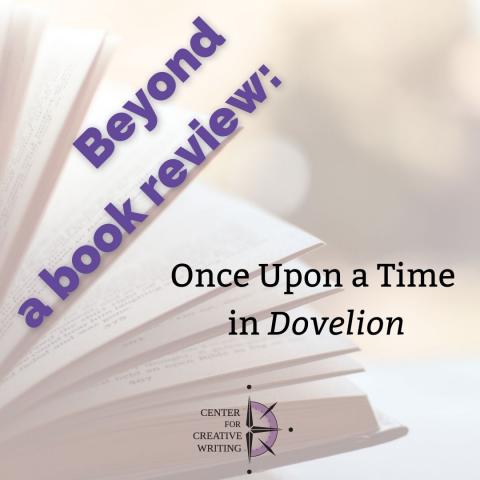
Shawna Ayoub moves "beyond the book review" in not only recommending great books by diverse writers, but highlighting a technique to apply to your own writing.
Dovelion: A Fairy Tale for Our Times, by Eileen R. Tabios
Filipina American writer Eileen R. Tabios has written the first novel I’ve read that was written under constraint. Each passage begins with “Once upon a time,” which gives each brief section of the greater story a dreamlike quality—almost a fevered sensuality. It asks the question, “What is real?” while providing the answer.
And it comes with a built-in writing prompt.
The story follows the orphaned Elena as she engages in an affair with Ernst, her nonbinary lover. There is no shortage of hefty themes in this book: colonialism, gender identity, sex, dominance/submission, the types of love. The narration of this story bounces through time, moving back and forth to the main character approaching the doorway of the man with whom she has an affair. Ultimately, the journey feels disjointed, but that seems intentional. The writing is strong, as is the prompt, which makes this interesting reading.
There are times when the world feels like a place of consequences. That definitely seemed true for Elena. The act of couching each moment in her story as though she were living a fairytale served to soften a story that has a hard edge.
Creating distance with “Once upon a time…”
My biggest takeaway from this novel was a question: As I read, I found myself wondering about my own once-upon-a-time. How would it feel to approach the pains of my past with this prompt as the passageway in? How would it feel to layer reality with myth or magic? How would the separation serve me?
What if we wrote into that? Lashing our pasts to the incantation that begins our culture’s most beloved stories can help us create distance between then and now. It asks us to see ourselves and characters and look for the magic in our own lives. It invites us to separate ourselves from reality where necessary and create something new and better. Let’s try it.
A writing exercise
For 15 minutes, write. Begin with the phrase, “Once upon a time.” Give yourself permission to write “the truth,” but also to branch out and include fantasy, mythology, dream logic, or anything else that feels right, even if it isn’t constrained by reality. In this way, the prompt is a constraint and a freedom from constraint.
After your time has passed, check in with yourself. How did that writing feel? Is there more to say? Did you stick with reality or did you write something different? How did this act of writing differ from other writing you’ve done?
Will you try this exercise? Read this book? Share with us in the comments.
Buy Dovelion: A Fairy Tale for Our Times at Bookshop.org (and support independent bookstores across the U.S.)
Related reading
Beyond a Book Review: Narrators and Compassion in Finding La Negrita
Beyond a Book Review: Research as Connection in Through the Banks of the Red Cedar
Beyond a Book Review: Intuition in River Woman, River Demon
Beyond a Book Review: Timeline(s) in Becoming AppalAsian
Beyond a Book Review: Unwieldy Creatures and retelling our stories
Beyond a Book Review: Containers as safe spaces in Nonwhite and Woman
Beyond a Book Review: Footnotes in Belly to the Brutal
Want to receive prompts, tips, and inspiration like this in your inbox every Sunday morning? Join our email list community! You will receive weekly advice, a year’s worth of weekly writing prompts as a FREE download, and be eligible to participate in our monthly photo prompt contest for a chance to share an original piece of writing with our community of more than 2,500 writers.
